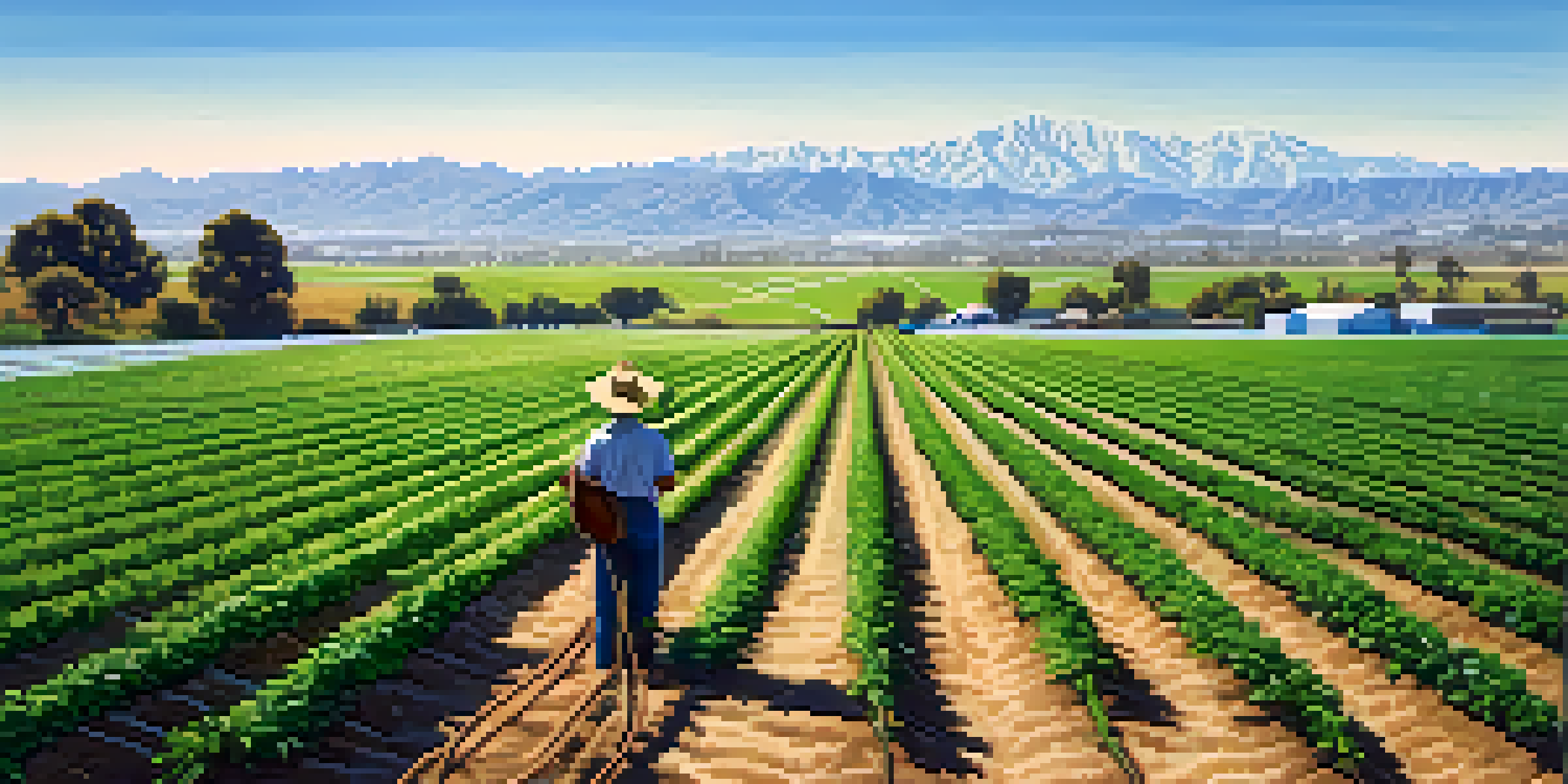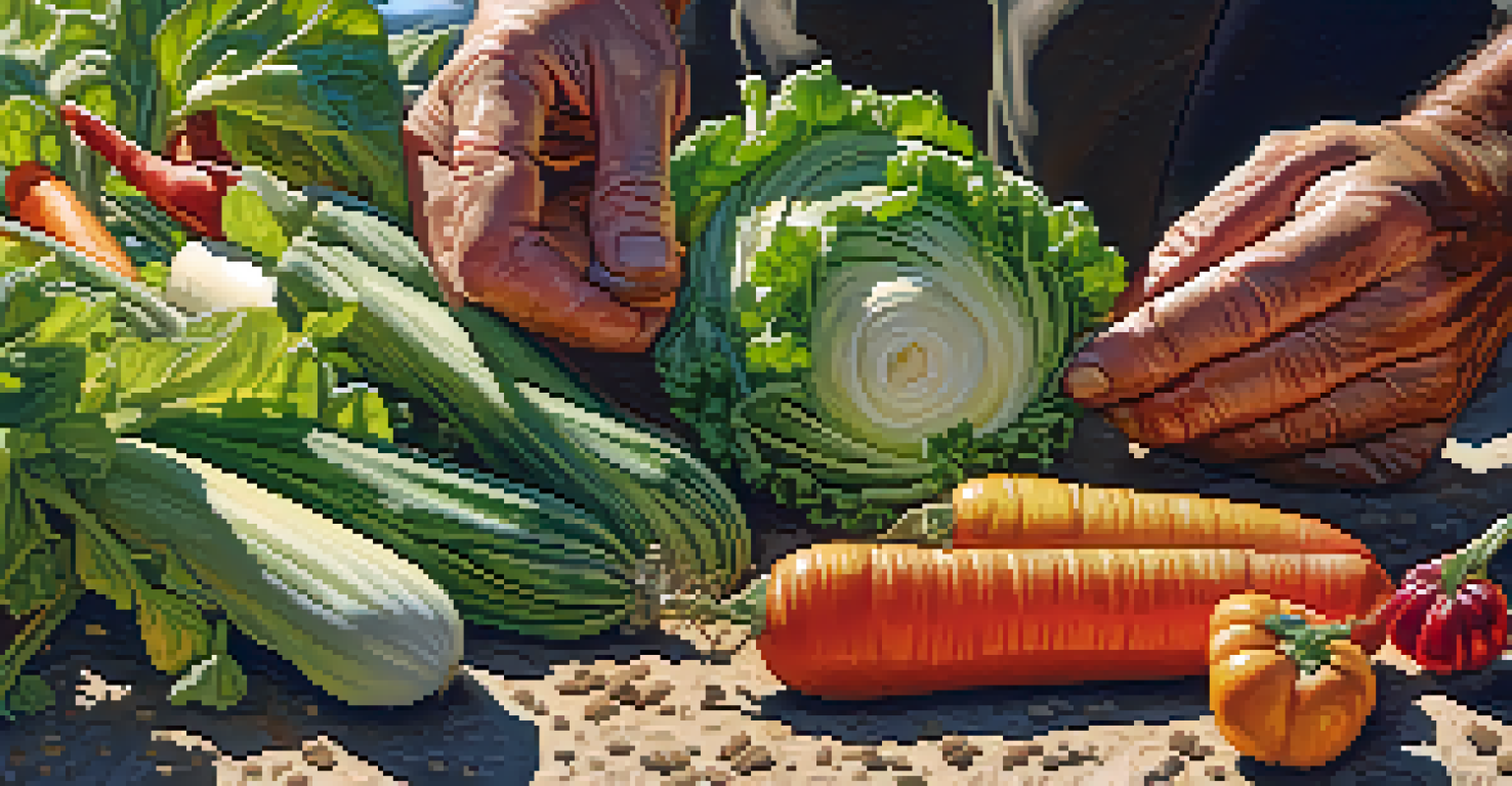Climate Change and Los Angeles Agriculture: A Growing Concern

Understanding Climate Change and Its Effects on Agriculture
Climate change refers to long-term shifts in temperatures and weather patterns, primarily due to human activities. In agricultural contexts, these shifts can lead to unpredictable weather events, affecting crop yields and farming practices. For farmers in Los Angeles, this means adapting to new challenges that could threaten their livelihoods.
What we are really talking about is a change in the relationship between humans and nature.
One of the most significant impacts of climate change is the increase in extreme weather events, such as droughts and floods. These conditions can create a rollercoaster effect for farmers, making it difficult to predict when to plant or harvest crops. Imagine planting a garden only to have it washed away by heavy rains or scorched by an unexpected heatwave; that's the reality many farmers face today.
Additionally, rising temperatures can alter growing seasons, pushing some crops out of their optimal growing conditions. This forces farmers to either adapt by choosing more resilient crops or face potential losses. In Los Angeles, where agriculture is a vital part of the economy, understanding these changes is crucial for both farmers and consumers alike.
The Impact of Drought on Los Angeles Agriculture
Drought is perhaps one of the most pressing concerns for Los Angeles farmers, given the region's already limited water supply. With climate change leading to decreased rainfall and longer dry spells, agriculture here faces unprecedented risks. For example, the California drought of 2012-2016 severely affected crop production, prompting farmers to rethink their water usage strategies.

Farmers often turn to irrigation systems to combat drought, but these systems can be costly and may not be sustainable in the long run. They must balance the need for water with the environmental impact of such practices. Picture a farmer watering their crops with a limited garden hose; this is the tightrope that many are forced to walk.
Climate Change Disrupts Agriculture
Farmers in Los Angeles face unpredictable weather and shifting crop viability due to climate change.
Moreover, the strain of drought can lead to increased competition for water resources, not just among farmers but also with urban areas. This conflict can drive up water costs, creating an additional burden for agricultural producers. In essence, persistent drought conditions could reshape the agricultural landscape of Los Angeles, pushing some farmers out of business altogether.
Shifts in Crop Viability Due to Climate Change
As temperatures rise, the types of crops that can thrive in Los Angeles are changing. Certain crops that once flourished in the region may no longer be viable, requiring farmers to seek alternatives. For instance, traditional crops like lettuce and strawberries might struggle, while drought-resistant varieties might gain prominence.
The greatest threat to our planet is the belief that someone else will save it.
This shift not only affects farmers' decisions but also has implications for local food markets and consumer choices. Think of it like changing your favorite dish because the ingredients are no longer available; that's the kind of adjustment that may become necessary. Farmers must stay informed about new crop varieties that can withstand changing conditions.
Additionally, the loss of crop diversity can lead to increased vulnerability to pests and diseases. If farmers rely too heavily on a few types of crops, a single pest outbreak could devastate their entire harvest. This situation emphasizes the importance of sustainable practices and diversifying crops to build resilience against climate change.
Pest and Disease Pressure in a Changing Climate
With climate change, the patterns of pest and disease outbreaks are becoming more unpredictable. Warmer temperatures can create favorable conditions for pests that previously could not survive in Los Angeles. Farmers are now finding themselves in a constant battle against these invaders, which can devastate crops and reduce yields.
For example, certain insects thrive in warmer climates, leading to increased infestations. Farmers must invest time and resources into pest management strategies, which can be both costly and labor-intensive. Imagine battling a swarm of locusts while trying to maintain your crops; that's the kind of struggle many face.
Drought Challenges Water Resources
Ongoing drought conditions force Los Angeles farmers to rethink water management strategies and adapt to limited supplies.
Moreover, diseases that were once manageable can become more aggressive in changing climates, leading to crop failures. As farmers grapple with this new reality, they may need to adopt integrated pest management practices that combine biological, cultural, and chemical controls. Ultimately, adapting to these challenges is essential for sustaining agriculture in Los Angeles.
Water Management Strategies for Sustainable Agriculture
Given the ongoing water crisis exacerbated by climate change, effective water management is crucial for Los Angeles farmers. Innovative practices such as drip irrigation and rainwater harvesting can help maximize water use efficiency. These strategies allow farmers to conserve precious water resources while maintaining crop productivity.
For instance, drip irrigation delivers water directly to the roots of plants, minimizing waste from evaporation and runoff. It's like having a personal water bottle for each of your plants—ensuring they get just what they need without excess. Implementing such technologies can make a significant difference in the face of dwindling water supplies.
Additionally, farmers might explore crop rotation and cover cropping, which can enhance soil health and improve water retention. These practices not only help in conserving water but also contribute to healthier ecosystems. By fostering sustainable agriculture, farmers can better prepare for the impacts of climate change while ensuring food security for the community.
Community Support and Education in Agriculture
As the effects of climate change ripple through agriculture, community support plays a crucial role in helping farmers adapt. Local organizations and educational programs can provide resources and training on sustainable farming practices. These initiatives empower farmers with knowledge, allowing them to make informed decisions that benefit their operations.
For example, workshops on water conservation techniques or pest management can equip farmers with practical skills to tackle climate challenges. Think of it as a community coming together to share tips and tricks for gardening; this collaboration can foster resilience among agricultural producers. When farmers unite, they can share experiences and solutions that are beneficial for all.
Community Support is Essential
Local organizations and consumer awareness are crucial for empowering farmers to adopt sustainable practices amid climate challenges.
Furthermore, consumer awareness and support for local agriculture can create a positive feedback loop. When people prioritize buying from local farmers, it strengthens the local economy and encourages sustainable practices. By fostering a strong relationship between consumers and producers, we can build a more resilient agricultural community in Los Angeles.
The Future of Agriculture in Los Angeles Amid Climate Change
Looking ahead, the future of agriculture in Los Angeles will depend heavily on how farmers and communities respond to climate change. Adaptation and resilience will be key themes as producers navigate the challenges ahead. With the right tools, knowledge, and community support, there’s hope for a sustainable agricultural future.
Innovations in technology and farming practices will likely play a significant role in this transformation. From precision agriculture to vertical farming, these advancements can help optimize resources and bolster productivity. Imagine a world where technology and nature work hand in hand for a sustainable food supply; that vision is becoming increasingly attainable.

Ultimately, the collaboration between farmers, consumers, and local governments will shape the trajectory of Los Angeles agriculture. By prioritizing sustainability and resilience, we can ensure that farming remains a vital part of the region's identity. Together, we can adapt to climate change and protect the future of agriculture in Los Angeles.